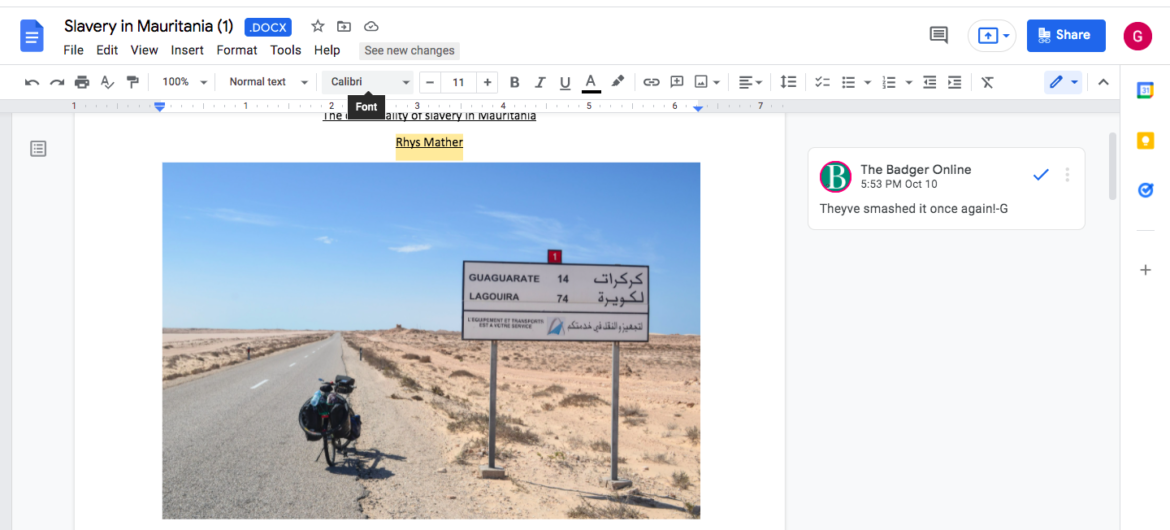Image credits: jbdodane- flickr
This article discusses slavery and sexual violence
Words By Rhys Mather
Slavery is endemic in Mauritania, with the Global Slavery Index estimating 2.4% of the population were living in descent-based slavery in 2018, with a further 62% being vulnerable to slavery – In 2017, the BBC reported 600,000 people were living in bondage. The Mauritanian government has little interest in acknowledging the reality of slavery, with a minster stating “All people are free in Mauritania” in 2012. Government apathy concerning slavery isn’t anything new – in 1981 Mauritania became the last country in the world to abolish slavery. However, slavery wasn’t made a crime until 2007 and only two slave owners have ever been successfully prosecuted, according to Anti-Slavery International.
Mauritania is a vast Saharan nation, with 90% of its territory residing in the desert. France violently colonised the region in 1904 for strategic purposes and access to West-African coastal trade, colonial rule lasted until 1960, in that time no real attempt was made to abolish the centuries old practice of slavery. In fact, colonial France supported and reinforced Mauritania’s deeply racist caste system where dark-skinned “Haratin”, an indigenous group in the region, are often treated as the property of light skinned “Beidane” enslavers. Many Haratin are born into hereditary slavery, as a result they are perceived as a slave-class in Mauritanian society and free Haratins are still victims of extreme prejudice, with virtually no access to education or well-paid jobs. Only one Haratin ever sat on the now abolished senate despite constituting 40% of Mauritania’s population. CNN (Cable News Network) reporters visiting the country documented the grim reality of this caste-system:
“That reality (slavery) permeates every aspect of Mauritanian life — from the dark-skinned boys who serve mint-flavored tea at restaurants to the clothes people wear. A man wearing a powder-blue garment that billows at the arms and has fancy gold embroidery on the chest is almost certainly free and comes from the traditional slave-owning class of White Moors, who are lighter-skinned Arabs. A woman in a loud tie-dye print that covers her hair, but not her arms, is likely a slave. Her arms are exposed, against custom, so she can work.”
Slavery disproportionately affects Mauritanian women; the UN human rights committee estimates 90% of modern-day slaves are women. These women are made to perform gruelling physical labour and are often sexually abused, with many being forced to have their enslaver’s children. The cruelty they endure is beyond imagination, the Guardian published this account of former slave Aichetou Mint M’barack:
“she was taken away from her mother and then given to a member of the master’s family to be a servant. She got married in the home of her masters and had eight children, two of whom were taken away from her to be slaves in other families. In 2010, Aichetou’s older sister was able to free her with the help of IRA-Mauritania (The Initiative for the Resurgence of the Abolitionist Movement), after she herself fled her masters when they poured hot embers over her baby, killing it. Aichetou and her eight children are now free and live together in Nouakchott.”
Children being born into slavery are often taken from their families, speaking to CNN, a woman who escaped enslavement named Moulkheir says she never knew her mother, as a result these people are told from infancy that they are property, and many come to believe it. CNN interviewed Abdel Nasser Ould Ethmane, a prominent abolitionist in Mauritania. Abdel was ‘given’ his first enslaved person when he was 7 years old. However, after reading books about the French revolution, Abdel decided to free the captives when he was 16. Their response stunned him; “They did not want to be free, he recalled. Or they didn’t know what freedom was.”. Abdel later went on to found SOS slaves, the organisation that freed Moulkheir. This is the dire situation of Mauritanian slavery, people brainwashed after generations of servitude to believe they can only ever be enslaved and with even noteworthy abolitionists being former slave owners- the country doesn’t expect a political solution anytime soon.
While several anti-slavery movements do exist in Mauritania, they have endured increased government scrutiny since the election of President Mohamed Ould Ghazouani in June 2018 and Reuters reports that local activists feel the government has regressed on the issue of slavery, despite it now supposedly being a criminal offence. The Mauritanian government has been known to crack-down on anti-slavery activism, amnesty reports that Biram Dah Abeid, the president of IRA-Mauritania was arrested alongside another activist and two journalists in 2017. Biram, sometimes called the “Mauritanian Nelson Mandela”, has been arrested several times for his activism and to prevent him from participating in the 2018 parliamentary elections, where he was elected MP. People like Biram represent hope in what seems like a hopeless situation, upon his election to parliament he stated, “I will do everything possible to demonstrate that slavery, racism and torture are set up as a system of management by a small entity around a very corrupt head of state.” He won 18.58% of the electoral vote in the 2019 presidential elections.
CNN calls Mauritania “slavery’s last stronghold” and while slavery is alive and well throughout the world, the Global Slavery Index estimates that Mauritania has the highest proportion of people living in slavery of any nation. With mounting international pressure and prominent abolitionist politicians, a Mauritania without slavery could be a reality and for the thousands currently living in bondage, that future can’t come soon enough.



